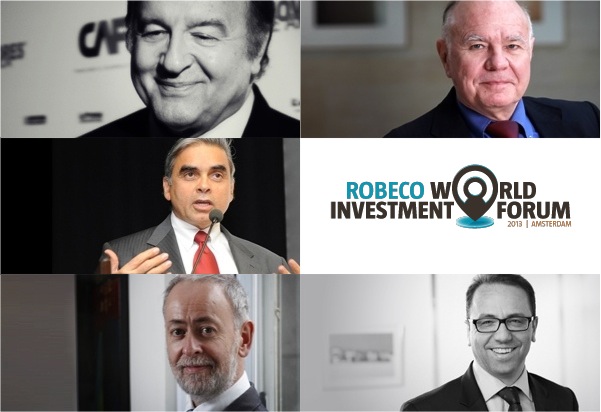Social inequality emerged as a key worry among guest speakers and other participants at the Robeco World Investment Forum. But what other geopolitical risks are keeping investors awake at night?
Here’s a question. How many of the delegates at the Robeco World Investment Forum—a mix of key clients and senior Robeco people—voted that social inequality was the number one geopolitical risk facing the world today? 5%? 25%? 50% even?
Not close. It turned out that 75% of participants agreed that this was the main issue.
That was one of the eye-opening takeaways from the Forum, which took place at the Hotel Okura in Amsterdam on 19 & 20 April.
De Soto concerned about Muslim exclusion from economic opportunities
One of speakers to address the issue of social inequality was Hernando de Soto, the economist and chairman of Peru’s Institute for Liberty and Democracy. He did so by discussing the widespread sense of exclusion felt in the Muslim world. De Soto spoke of Tarek al-Tayeb Mohamed Bouazizi, the Tunisian street vendor widely felt to have set the Arab Spring in motion when he set himself on fire in December 2010 in protest at the confiscation of his goods.
But de Soto also noted that there were a total of 64 people across the Arab world who self-immolated in the same period. And the evidence from the 25 of the 64 who survived was that all of them were businessmen who acted when they felt their rights had been trampled on: they suffered from what de Soto called “expropriation”.
“This is a revolution of a lot of small entrepreneurs,” said De Soto.“Just because they don’t wear striped suits, it doesn’t mean they aren’t on our side.”
“The rich will pay more” says Marc Faber
According to Marc Faber, the Thailand-based Swiss contrarian investor, social inequality is a warning signal pointing to a bursting of the bubble in asset prices. “Asset prices are going up, but the standards of living of the typical household in Europe and the US is going down,” he said.
And he sees only one way out of this situation: “the rich will have to pay more,” he said. “When the masses of the poor grow more than the power of the few, the rich have to pay. Usually history solved this problem through taxation to distribute to the poor or by revolution.”
He added that the Cyprus bail-out, which saw brutal haircuts for savers with over EUR 100,000, was a first step in this process. “The writing is on the wall,” he said.
Kishore Mahbubani fears the rise of Islam
But the disruptive potential of social inequality was by no means a unanimous viewpoint. One guest speaker who rejected it was Kishore Mahbubani, Professor in Public Policy at the National University of Singapore.
“It is absolutely wrong to say that social inequality is going to be a geopolitical risk,” he said. “It is going to be a major challenge but, paradoxically, the rising concerns about social inequality will lead to geopolitical stability. That’s because the priorities of all governments are domestically focused.”
So what geopolitical risk does worry the author of The Great Convergence: Asia, the West and the Logic of One World? Mahbubani—who offered three upbeat predictions for the region: there will be no major interstate war in east Asia, Asia’s major economies will continue to grow and the Asian middle class will experience an “explosion” in numbers over the next few years—worries about a clash between Islam and the West.
“There’s a very strong emotional divide between Islam and the West. That has been very badly mishandled by the West,” he said. The problem will intensify as Islamic countries such as Indonesia and Turkey become increasingly successful, he believes. “As the Islamic world becomes more successful economically and more assertive politically, then you’ll see a real challenge for the West,” he cautioned.
Aging time bomb worries Jim Walker
The key issue for Jim Walker, Managing Director atAsianomics, was demographics. More specifically, he is concerned about “the coming war between the old and the young, because we’ve got too many old people in Europe, in China and in Japan to pay for them. The only people who can pay for them are the young, who are much better with guns than people my age.”
Systemic risk still on the table for Mlynar
Corestone Investment Managers’ Martin Mlynar was also worried about what he called “the generation aspect”. But he added two others geopolitical concerns. “I’m still worried that the problems in a number of countries might lead to a systemic financial failure. We still don’t understand the effect of Bernanke’s bond buying or of the monetary policy in Japan. I’m not sure that we are out of the woods in terms of systemic risk.”
Mlynar’s third worry was food and water. “Food and water shortages—water especially—might lead to a number of wars,” he said.
But the final word goes to Jim Walker. “20 people around the world are causing us the most incredible pain and probably the biggest economic crisis in history in five years’ time.” He admitted he couldn’t remember all their names but warned: “Just remember: head of central bank.”
